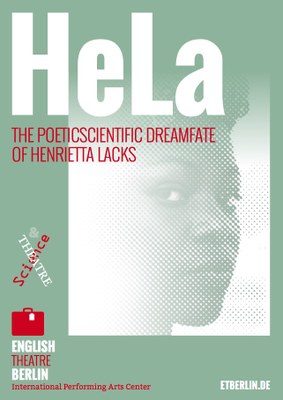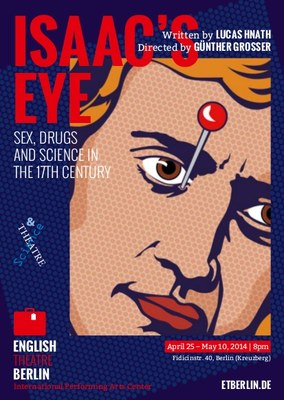Archive

"Informed Consent" by Deborah Zoe Laufer
A staged reading of a new science play by Deborah Zoe Laufer about identity, representation and the answer to the question of who owns the rights to genetic knowledge.
Staged reading on November 25, 2016.
More information on the theatre´s websites http://www.etberlin.de/production/informed-consent/

"TRANSCENDENCE" by Robert Marc Friedman
EINSTEIN, KAFKA AND PLANCK VS. TIME, SPACE AND CONVENTIONS
World premiere of a new play by Robert Marc Friedman
The foundations of European society were being shaken when Albert Einstein presented his general theory of relativity in Berlin on November 25, 1915 – now even space, time, gravity and the cosmos were no longer what they used to be.
Transcendence tells a tale of strained friendships, the search for new perspectives and scientific integrity against a backdrop of a fierce battle between uncompromising
opponents in a decaying society.
Performances were on November 20 – 22, 25 – 30, 2015, 8pm, at the English Theatre Berlin, Fidicinstr. 40, Berlin-Kreuzberg. More information on the theatre´s website
Lecture by Prof. Tilman Sauer (Universität Mainz): Einstein’s Rise to Fame and the Emergence of Modern Theoretical Physics / Sunday November 29th, 7pm
Post-performance discussion with Regine Hengge, Robert Marc Friedman, Gunther Grosser and the cast on November 25th, 2015 in conjunction with Theater Scoutings Berlin!

"Isaac´s Eye" by Lucas Hnath
SEX, DRUGS & SCIENCE IN THE 17TH CENTURY
Isaac Newton wants to become a member of the Royal Society. Catherine wants to start a family. Robert Hooke wants to know what Newton knows. The guy with the plague wants to stay alive. They conduct a risky experiment. Afterwards, Newton doesn’t know any more than before but Hooke gets his sex diary back, Catherine’s skepticism is stronger than ever and the guy with the plague is dead. Science moves in mysterious ways. Isaac’s Eye mixes the facts of Isaac Newton’s life with an equal dose of fiction to explore what great people are willing to sacrifice to become great people. It puts the history of science onstage, juxtaposing historical characters and facts with our 21st century based projection of them. And by the way – it’s the best science comedy out there!
Performances were on April 25 to May 10, 2014.
Pre-performance lecture The Airpump, the Prism, and Other Challenges: What Can We Learn From 17th Century Experiments? by Prof. Friedrich Steinle (Technische Universität Berlin) on Wednesday, May 7th, 7pm
Post-performance discussion with Prof. Regine Hengge, Günther Grosser and the cast on Wednesday, April 30
Performances were on March 25 - 28, 2015
More information on the theatre´s websites http://www.etberlin.de/production/isaacs-eye-2/
Supported by the Andrea von Braun Stiftung


"Isaac´s Eye" by Lucas Hnath
staged reading
Young Isaac Newton desperately wants to become a member of the club of clubs for scientists, the Royal Society. In order to convince Robert Hooke, the institution´s curator of experiments, he sticks a needle into his tear duct to prove that light is made of particles. Ouch!! And if science won´t do it there is another way: Hooke keeps a detailed diary of his sex life...
A play about ambition and competition in science and what great people are willing to sacrifice to become great people.
A staged reading took place at the English Theatre Berlin on August 17, 2013.
More information on the theatre´s websites http://www.etberlin.de/production/isaacs-eye/
The third round of the Science&Theatre project presented a new science play, "Photograph 51", by Anna Ziegler. In addition, the project expanded to include joint activities with several Berlin high schools, using a creative approach to science communication.

"Photograph 51" by Anna Ziegler
A play about the discovery of the DNA double helix structure and the role of Rosalind Franklin, dealing with DNA as the icon of our time and the role of women in science. Anna Ziegler's play shows the making of an outstanding scientific discovery in a bone-dry, ritualized and women-excluding male establishment, in which an emotional minefield, social coldness and hierarchies, antisemitism, and ferocious fighting for recognition and scientific priority went hand-in-hand with scientific curiosity, meticulousness and juvenile enthusiasm.
Performances were on February 24-25 and 28-29, March 1-3 and 6-10, 2012.
More information on the theatre's website http://www.etberlin.de/production/photograph-51/
Photos from the play http://mikrobiologie.hu-berlin.de/hengge/science_and_theatre/archive/photograph51_scenes
Supported by Schering Stiftung

An evening on "Women in Science": Public lecture and discussion with Prof. Dr. Regine Hengge (Institute of Biology, FU Berlin) on "Women in Science - Past and Present", followed by two documentary films by Rosemarie Reed: on Lise Meitner ("The Path to Nuclear Fission") and Irène and Frédèric Joliot-Curie ("Out from the Shadows").
Monday, March 5, 2012, 7 p.m, on the Main Stage of the ETB.
„Designer Jeans Genes“ consists of performances and an exhibition exploring the future of human genetics and synthetic biology, developed by students from three Berlin high schools in collaboration with the Science&Theatre project.
More information on the theatre's website http://www.etberlin.de/production/designer-genes/
Photos from the project http://mikrobiologie.hu-berlin.de/hengge/science_and_theatre/archive/designer-genes_photos

"An Experiment with an Air Pump" by Shelagh Stephenson
A social drama, a science play and a thriller exploring the question of how much morality science can take - and how much it needs - with two compelling examples from two different times in history. To what lengths should the study of anatomy go to procure cadavers at the end of the 18th century? And how far should genetics go at the beginning of the 21st centruy?
This play ran from February 8-27, 2011.
More Information on the theatre's website http://www.etberlin.de/production/an-experiment-with-an-air-pump/
Photos from the play http://mikrobiologie.hu-berlin.de/hengge/science_and_theatre/archive/airpump_Scenes
Supported by


"A Number" by Caryl Churchill
By telling a provocative story about human cloning, this play deals with questions of human identity and nature and nurture of complex human traits.
This play premiered on June 3, 2010 and was brought back to the ETB stage in Nov. 2010, June 2011 and Sept. 2011. It will be shown occasionally in the future.
More Information on the theatre's website http://www.etberlin.de/production/a-number/

Public Lecture with Prof. Dr. Jon Beckwith (Harvard Medical School):
"Genetics and Human Behavior. The persistence of failed scientific ideas".
November 7th, 2010 at the English Theatre Berlin.
More Photos from Prof. Beckwith's lecture http://mikrobiologie.hu-berlin.de/hengge/science_and_theatre/archive/beckwith_lecture
For additional information on the project and accompanying events, visit the homepage of the English Theatre Berlin.